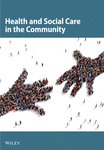Understanding the dynamics of life in care homes for older people: implications for de-institutionalizing practice
At the time of writing the paper JR was the Department of Health Post-Doctoral Nursing Research Fellow and VRP was Research Associate at the Centre for Health Services Research
Abstract
This paper describes some of the findings of a study undertaken to examine the processes of adaptation that older people engage in when moving into care homes, that is nursing and residential homes. In particular, the paper presents data from resident interviews which indicate the importance of the relationships that they develop with each other, and also data from staff focus groups, which indicates that staff have a limited awareness of this. We contend that attempts to develop practice in care homes to overcome the effects of institutionalization, frequently promoted through the concept of individualized care within the context of the carer-resident relationship, could benefit from a parallel recognition of the importance of resident groups in enhancing the experience of life in care homes. In other words, just as individuals have needs, so too do the home communities of which these people are members.




